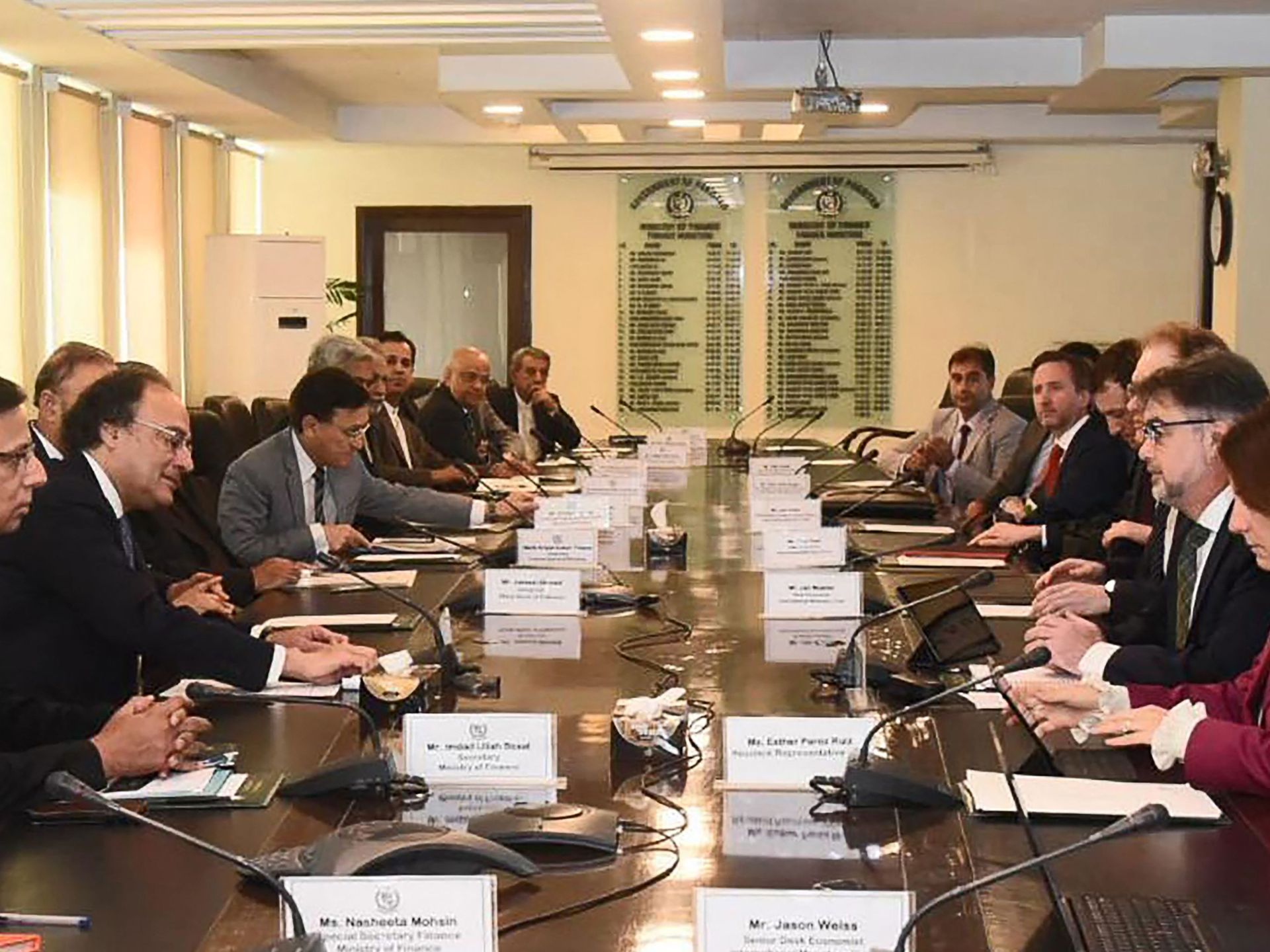Part of the meeting of Pakistani officials with the IMF delegation in Islamabad a few days ago (French)
The International Monetary Fund said on Wednesday that it had reached an agreement at the expert level with Pakistan, and if it received the approval of the Fund’s Board of Directors, $1.1 billion would be disbursed to the country, which is burdened with debt and has a balance of payments crisis.
This money is the final installment of a $3 billion rescue package that Pakistan received last summer, which saved it from defaulting on sovereign debt.
Islamabad is also seeking another long-term rescue plan.
This approval comes at a time when Pakistan faces ongoing economic challenges, expressing its interest in another loan program to support its economy, according to Bloomberg.
Bloomberg reported that the staff-level agreement for the second review of the program paves the way for the disbursement of approximately $1.1 billion, pending final approval from the Executive Board of the International Monetary Fund.
“Pakistan’s economic and financial situation has improved in the months following the first review, with economic growth and confidence continuing to recover on the back of prudent policy management and the resumption of flows from multilateral and bilateral partners,” the IMF said.
Pakistan declared its interest in a subsequent medium-term program to maintain the country’s economy and its treatment path (Reuters)
New program
According to Bloomberg, Pakistan has expressed interest in a subsequent medium-term program to maintain the country's economy and its recovery path.
The head of the International Monetary Fund mission to Pakistan, Nathan Porter, highlighted to Bloomberg the improvement of the country's economic and financial situation since the first review.
However, he stressed the need for continued policy and reform efforts to address challenges such as modest growth expectations and persistently high inflation.
With the country's external financing needs estimated at approximately $24 billion in the next fiscal year (starting next July 1), nearly three times its foreign exchange reserves, Pakistan's dependence on IMF aid remains urgent, according to observers.
Fruits of agreement
In response to the agreement, Pakistani dollar bonds saw a notable rise, with 2025 bonds rising by 1.2 cents to 93.5 cents on the dollar, reaching their highest level since March 2022. Likewise, the Pakistani rupee also saw gains, rising by 0.11% to 278.4 against the dollar, recording its highest level in 5 months.
Prime Minister Shehbaz Sharif, who took office earlier this month, wasted no time in prioritizing negotiations with the International Monetary Fund on a new facility.
In previous statements, he stressed the importance of expanding the tax base, improving debt sustainability, and revitalizing the energy sector, and identified the main objectives of the upcoming loan program.
One of the markets in central Islamabad (Al Jazeera)
Challenges and design
Sharif's determination to confront these challenges is evident as he navigates the complexities of guiding the coalition government toward critical decisions, including potential adjustments to energy prices that the International Monetary Fund is seeking in exchange for financial support.
However, concerns remain about the sustainability of the reforms and the potential for reform fatigue on the economy, especially once a new IMF program is approved.
David Lovinger, Managing Director of the Emerging Markets Group at TCW Group, highlighted to Bloomberg the inevitability of challenges after the approval of a new IMF program.
Despite Pakistan's impressive market performance since it received IMF aid last summer, concerns remain about its long-term trajectory.
However, the agency notes that optimism prevails among investors, as the Pakistani stock market has witnessed a notable rise of 60% since the start of the IMF program.
In addition, the country's dollar bonds posted significant gains, outperforming many emerging markets and reflecting growing confidence in Pakistan's economic resilience.
Pakistan renews its commitment to achieving key fiscal targets, including the initial balance target of 0.4% of GDP.
The Central Bank of Pakistan reaffirmed its commitment to maintaining prudent monetary policies aimed at reducing inflation and ensuring exchange rate flexibility.
Source: Al Jazeera + agencies

